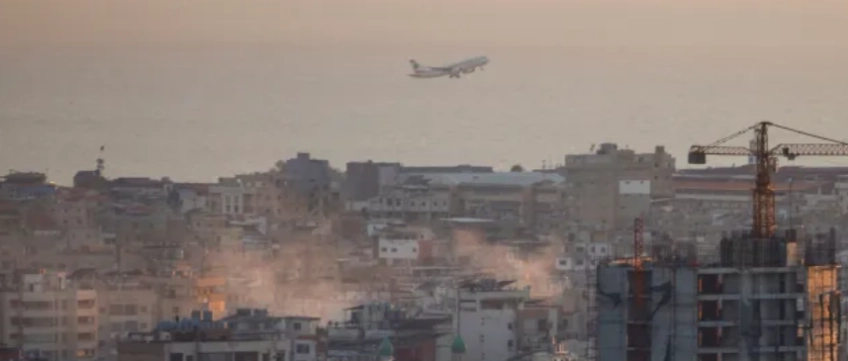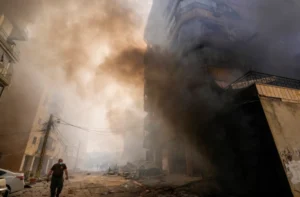Escalating Tensions: Israel’s Military Operations Against Hezbollah and Iranian Influence
As the conflict between Israel and Hezbollah intensifies, the situation in Lebanon remains precarious. Recent military operations have seen Israel targeting Hezbollah positions in response to a series of attacks that have escalated tensions across the region. This article explores the latest developments, the implications for regional stability, and the broader geopolitical landscape shaped by these events.
The Current Situation: Military Strikes and Casualties
 On October 5, 2024, Israeli airstrikes intensified across Lebanon, particularly targeting areas associated with Hezbollah. Reports indicate that at least 440 Hezbollah operatives have been killed since Israel launched its ground operations in southern Lebanon. The Israeli Defense Forces (IDF) have been systematically dismantling Hezbollah’s infrastructure, including leadership figures and military assets.
On October 5, 2024, Israeli airstrikes intensified across Lebanon, particularly targeting areas associated with Hezbollah. Reports indicate that at least 440 Hezbollah operatives have been killed since Israel launched its ground operations in southern Lebanon. The Israeli Defense Forces (IDF) have been systematically dismantling Hezbollah’s infrastructure, including leadership figures and military assets.
The strikes have not only affected military targets but also civilian areas, leading to widespread destruction. In Tripoli, northern Lebanon, an Israeli airstrike reportedly killed a Hamas commander, further complicating the already volatile situation. The Lebanese state media has reported significant casualties among both Hezbollah fighters and civilians, raising concerns about humanitarian impacts as the conflict escalates.
Evacuations and Civilian Impact
In light of the ongoing military operations, the IDF issued evacuation alerts for civilians in Dahiya, a district south of Beirut known for its heavy Hezbollah presence. This move indicates a potential escalation in military actions aimed at neutralizing threats posed by the militant group.
The humanitarian situation in Lebanon is dire. Many civilians are displaced and living in fear as airstrikes continue to rain down on populated areas. Hospitals are overwhelmed with casualties, and essential services are strained under the pressure of ongoing conflict. The Lebanese population finds itself trapped between warring factions with little recourse for safety or support.
Iran’s Role: A Growing Concern
 The conflict has drawn attention to Iran’s involvement in supporting both Hezbollah and Hamas. Iranian Supreme Leader Ayatollah Ali Khamenei has made statements indicating that Iran will consider further military actions against Israel if necessary.
The conflict has drawn attention to Iran’s involvement in supporting both Hezbollah and Hamas. Iranian Supreme Leader Ayatollah Ali Khamenei has made statements indicating that Iran will consider further military actions against Israel if necessary.
Earlier this week, Iran launched ballistic missiles toward Israel, escalating tensions further. Iran’s support for militant groups in the region complicates peace efforts and raises fears of a broader regional conflict. As tensions escalate, international observers are closely monitoring Iran’s actions and their potential repercussions for stability in the Middle East.
International Reactions: Calls for Ceasefire
In response to the escalating violence, there have been calls from various international leaders for a ceasefire. U.S. President Joe Biden has reiterated his demand for a halt to hostilities between Israel and Hezbollah, emphasizing the need for diplomatic solutions to prevent further loss of life.
The United Nations has also expressed concern over the humanitarian crisis unfolding in Lebanon. As airstrikes continue to displace thousands and inflict civilian casualties, there is an urgent need for international intervention to address the growing crisis.
The Broader Geopolitical Landscape
The ongoing conflict between Israel and Hezbollah is not occurring in isolation; it is part of a larger geopolitical struggle involving multiple players in the region. The dynamics between Israel, Iran, and various militant groups create a complex web of alliances and enmities that complicate any potential resolution.
As Israel continues its military operations against Hezbollah, it must also consider its relationship with other regional powers. The potential for escalation into a wider conflict remains high if diplomatic efforts fail to achieve a ceasefire.
Conclusion: A Call for Urgent Action
The situation in Lebanon is rapidly deteriorating as Israeli military operations against Hezbollah intensify. With significant casualties reported among both combatants and civilians, there is an urgent need for international intervention to address the humanitarian crisis and facilitate dialogue between conflicting parties. As we witness these developments unfold, global leaders must prioritize diplomacy over military action.
The stakes are high—not only for those directly involved but also for regional stability as a whole. Without immediate action to de-escalate tensions, the potential for further violence looms large over Lebanon and its neighbours.
